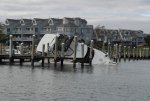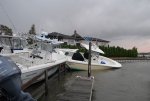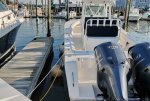toneeees
Administrator
- Joined
- Mar 15, 2011
- Messages
- 3,024
[FONT=Trebuchet MS, Lucida Grande, Arial, sans-serif]
She came in the middle of the night at high tide on a full moon packing high winds and pushing an unprecedented wall of water ahead of her. Hurricane Sandy was the most devastating storm to hit the Northeast coast in recorded history, claiming over 75 lives and destroying thousands of houses and businesses. The massive flooding compounded by wind damage to the power grid left tens of millions of people in the dark, and 20 days after the storm, there were still tens of thousands of homes in New York and New Jersey without power.[/FONT]
[FONT=Trebuchet MS, Lucida Grande, Arial, sans-serif]Sandy set another record-she damaged or destroyed over 65,000 recreational boats with an estimated loss to exceed $650 million. Over 32,000 boats in New York and 25,000 in New Jersey were impacted, and damage to the marine industry will likely be in the billions.[/FONT]
[FONT=Trebuchet MS, Lucida Grande, Arial, sans-serif]"There are lessons to be learned whenever a massive storm like Sandy strikes," said Scott Croft, Assistant Vice President for Public Relations at the Boat Owners Association of the United States (BoatUS®), one of the largest insurers of recreational boats in the country.[/FONT]
[FONT=Trebuchet MS, Lucida Grande, Arial, sans-serif]Major storms present three threats to recreational boats: surge, wind and rain. Sandy did most of its damage with a tide surge that ran from 10-to-14 feet.[/FONT]
[FONT=Trebuchet MS, Lucida Grande, Arial, sans-serif]"The scope of the damage to boats is unprecedented," Croft reported. "The combination of boats stored ashore at low elevations and record high surge levels caused thousands of boats to float away into neighborhoods, parks and marshes."[/FONT]
[FONT=Trebuchet MS, Lucida Grande, Arial, sans-serif]It appears that boats tied securely to robust floating docks with tall pilings fared far better than those blocked on land in low-lying areas, but floating docks that did not have pilings tall enough to withstand the upward surge of water lifted off the pilings and floated away with the boats still attached.[/FONT]
[FONT=Trebuchet MS, Lucida Grande, Arial, sans-serif] [/FONT]
[/FONT]
[FONT=Trebuchet MS, Lucida Grande, Arial, sans-serif]It is not prudent to base the hurricane plan for your boat on just the latest storm because the next one could have very different characteristics. Hauling and blocking boats prior to a major storm is recommended by emergency management staff and many insurance carriers such as another large recreational boat insurer, NBOA. Many even provide haul-out reimbursement to policy holders in such instances.[/FONT]
[FONT=Trebuchet MS, Lucida Grande, Arial, sans-serif]"There are storm conditions where keeping a boat tied up to a well-maintained, sheltered floating dock with pilings tall enough to handle the estimated surge is a smart choice," Croft advised, "but keep in mind that if massive rain amounts overtake your bilge pumps or high winds batter the boat in its slip, the only place for the vessel to go is down."[/FONT]
[FONT=Trebuchet MS, Lucida Grande, Arial, sans-serif]Surprisingly, many of the boats that floated off blocks sustained little or no damage so the majority of the cost was associated with the recovery of the vessel. This leads to another lesson that is directly related to your recreational boat insurance policy, and one you should review in light of what happened.[/FONT]
[FONT=Trebuchet MS, Lucida Grande, Arial, sans-serif]Not all recreational boat insurance policies include "full salvage" coverage. All boat policies include "hull" coverage, usually based on the agreed upon reimbursement value of the vessel. But unless your policy includes "full salvage" rider, you can be left holding the bag for thousands of dollars in costs associated with the recovery of your boat.[/FONT]
[FONT=Trebuchet MS, Lucida Grande, Arial, sans-serif] [/FONT]
[/FONT]
[FONT=Trebuchet MS, Lucida Grande, Arial, sans-serif]With Sandy, thousands of boats simply floated away coming to rest in unlikely places as the surge waters receded. They were found on public streets, on railroad tracks, in residential neighborhoods, in destroyed houses, on golf courses, and many were scattered around remote back bay areas miles from their original location. Salvaging some of these vessels will require special equipment and can cost thousands of dollars. Full salvage coverage pays for recovery costs up to the full value of the boat, but many policies either do not include salvage reimbursement or only reimburse up to a percentage of the value of the boat. Often policies offered with full salvage coverage are priced competitively with those that do not, so buyer beware.[/FONT]
[FONT=Trebuchet MS, Lucida Grande, Arial, sans-serif]Some insurance industry research revealed a startling statistic. Approximately half of the boats owned in the U.S. are not insured at all. In most states there is no legal requirement to have boat insurance, and a substantial number of owners of older boats simply do not purchase it. Newer boats that are financed are required to have insurance by the company holding the paper, and most marinas require slip customers to provide proof of insurance.[/FONT]
[FONT=Trebuchet MS, Lucida Grande, Arial, sans-serif]Regardless of whether you have insurance or not, a boat owner is responsible for the recovery of a boat after a storm and for any property damage the boat might have caused. The costs can also include penalties and fines for the remediation of any environmental impacts caused by fuel or oil spills from the vessel. To be exposed to these kinds of liabilities without the benefit of a comprehensive insurance policy-that for most outboard powered boats is reasonably priced-is simply incomprehensible. Furthermore, if your boat is simply abandoned, the state will come after you.[/FONT]
[FONT=Trebuchet MS, Lucida Grande, Arial, sans-serif]When tragedies like a major hurricane or a winter storm strike, the first thing on the minds of people impacted is to deal with the after effects and attempt to get their lives back to normal. Once that is done, it is smart to reassess what went right and what went wrong and make the appropriate changes. For those unaffected by the storm, observing and learning from the experiences of others, and using those experiences to develop a storm plan of their own, can help avoid problems caused by future storms.[/FONT]
[FONT=Trebuchet MS, Lucida Grande, Arial, sans-serif]It's good to check with your current insurance carrier or if anyone has questions on their current coverage and would like a complimentary review of their marine insurance policy, the agents at NBOA Marine Insurance are happy to help. They're available at 800-248-3512.[/FONT]
[FONT=Trebuchet MS, Lucida Grande, Arial, sans-serif]Article courtesy of Yamaha motors. For additional information on Yamaha boating, visit yamaha-motor.com.[/FONT]

She came in the middle of the night at high tide on a full moon packing high winds and pushing an unprecedented wall of water ahead of her. Hurricane Sandy was the most devastating storm to hit the Northeast coast in recorded history, claiming over 75 lives and destroying thousands of houses and businesses. The massive flooding compounded by wind damage to the power grid left tens of millions of people in the dark, and 20 days after the storm, there were still tens of thousands of homes in New York and New Jersey without power.[/FONT]
[FONT=Trebuchet MS, Lucida Grande, Arial, sans-serif]Sandy set another record-she damaged or destroyed over 65,000 recreational boats with an estimated loss to exceed $650 million. Over 32,000 boats in New York and 25,000 in New Jersey were impacted, and damage to the marine industry will likely be in the billions.[/FONT]
[FONT=Trebuchet MS, Lucida Grande, Arial, sans-serif]"There are lessons to be learned whenever a massive storm like Sandy strikes," said Scott Croft, Assistant Vice President for Public Relations at the Boat Owners Association of the United States (BoatUS®), one of the largest insurers of recreational boats in the country.[/FONT]
[FONT=Trebuchet MS, Lucida Grande, Arial, sans-serif]Major storms present three threats to recreational boats: surge, wind and rain. Sandy did most of its damage with a tide surge that ran from 10-to-14 feet.[/FONT]
[FONT=Trebuchet MS, Lucida Grande, Arial, sans-serif]"The scope of the damage to boats is unprecedented," Croft reported. "The combination of boats stored ashore at low elevations and record high surge levels caused thousands of boats to float away into neighborhoods, parks and marshes."[/FONT]
[FONT=Trebuchet MS, Lucida Grande, Arial, sans-serif]It appears that boats tied securely to robust floating docks with tall pilings fared far better than those blocked on land in low-lying areas, but floating docks that did not have pilings tall enough to withstand the upward surge of water lifted off the pilings and floated away with the boats still attached.[/FONT]
[FONT=Trebuchet MS, Lucida Grande, Arial, sans-serif]
 [/FONT]
[/FONT][FONT=Trebuchet MS, Lucida Grande, Arial, sans-serif]It is not prudent to base the hurricane plan for your boat on just the latest storm because the next one could have very different characteristics. Hauling and blocking boats prior to a major storm is recommended by emergency management staff and many insurance carriers such as another large recreational boat insurer, NBOA. Many even provide haul-out reimbursement to policy holders in such instances.[/FONT]
[FONT=Trebuchet MS, Lucida Grande, Arial, sans-serif]"There are storm conditions where keeping a boat tied up to a well-maintained, sheltered floating dock with pilings tall enough to handle the estimated surge is a smart choice," Croft advised, "but keep in mind that if massive rain amounts overtake your bilge pumps or high winds batter the boat in its slip, the only place for the vessel to go is down."[/FONT]
[FONT=Trebuchet MS, Lucida Grande, Arial, sans-serif]Surprisingly, many of the boats that floated off blocks sustained little or no damage so the majority of the cost was associated with the recovery of the vessel. This leads to another lesson that is directly related to your recreational boat insurance policy, and one you should review in light of what happened.[/FONT]
[FONT=Trebuchet MS, Lucida Grande, Arial, sans-serif]Not all recreational boat insurance policies include "full salvage" coverage. All boat policies include "hull" coverage, usually based on the agreed upon reimbursement value of the vessel. But unless your policy includes "full salvage" rider, you can be left holding the bag for thousands of dollars in costs associated with the recovery of your boat.[/FONT]
[FONT=Trebuchet MS, Lucida Grande, Arial, sans-serif]
 [/FONT]
[/FONT][FONT=Trebuchet MS, Lucida Grande, Arial, sans-serif]With Sandy, thousands of boats simply floated away coming to rest in unlikely places as the surge waters receded. They were found on public streets, on railroad tracks, in residential neighborhoods, in destroyed houses, on golf courses, and many were scattered around remote back bay areas miles from their original location. Salvaging some of these vessels will require special equipment and can cost thousands of dollars. Full salvage coverage pays for recovery costs up to the full value of the boat, but many policies either do not include salvage reimbursement or only reimburse up to a percentage of the value of the boat. Often policies offered with full salvage coverage are priced competitively with those that do not, so buyer beware.[/FONT]
[FONT=Trebuchet MS, Lucida Grande, Arial, sans-serif]Some insurance industry research revealed a startling statistic. Approximately half of the boats owned in the U.S. are not insured at all. In most states there is no legal requirement to have boat insurance, and a substantial number of owners of older boats simply do not purchase it. Newer boats that are financed are required to have insurance by the company holding the paper, and most marinas require slip customers to provide proof of insurance.[/FONT]
[FONT=Trebuchet MS, Lucida Grande, Arial, sans-serif]Regardless of whether you have insurance or not, a boat owner is responsible for the recovery of a boat after a storm and for any property damage the boat might have caused. The costs can also include penalties and fines for the remediation of any environmental impacts caused by fuel or oil spills from the vessel. To be exposed to these kinds of liabilities without the benefit of a comprehensive insurance policy-that for most outboard powered boats is reasonably priced-is simply incomprehensible. Furthermore, if your boat is simply abandoned, the state will come after you.[/FONT]
[FONT=Trebuchet MS, Lucida Grande, Arial, sans-serif]When tragedies like a major hurricane or a winter storm strike, the first thing on the minds of people impacted is to deal with the after effects and attempt to get their lives back to normal. Once that is done, it is smart to reassess what went right and what went wrong and make the appropriate changes. For those unaffected by the storm, observing and learning from the experiences of others, and using those experiences to develop a storm plan of their own, can help avoid problems caused by future storms.[/FONT]
[FONT=Trebuchet MS, Lucida Grande, Arial, sans-serif]It's good to check with your current insurance carrier or if anyone has questions on their current coverage and would like a complimentary review of their marine insurance policy, the agents at NBOA Marine Insurance are happy to help. They're available at 800-248-3512.[/FONT]
[FONT=Trebuchet MS, Lucida Grande, Arial, sans-serif]Article courtesy of Yamaha motors. For additional information on Yamaha boating, visit yamaha-motor.com.[/FONT]



















